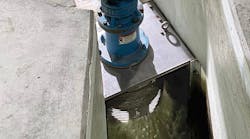When U.S. Environmental Protection Agency (EPA) regulations for radium tightened, some cities found themselves above the allowable limits. The levels in Mason, Mich., fluctuated from below to just slightly above the Maximum Contaminant Level. Since radium was an issue that had never been dealt with by Mason officials, they sent out a public inquiry to find the best system for radium removal. Seven teams presented their ideas and bid on the project.
Layne Christensen Co. was asked to join the Wolverine Eng. team to present options on radium removal treatment technologies. Layne presented approximately six techniques, with hydrous manganese oxide (HMO) being the most effective for removal of radium with the additional benefit of iron removal, which was found at higher levels in at least two of the four wells in Mason. Layne conducted pilot tests at the Ash Street well, and it was determined that the HMO system was the most suitable and cost-efficient option available. Since there were four wells, an engineering evaluation determined that treating at one central location was preferable over treating at each well facility.
The four existing wells and a fifth that was drilled at the time of the treatment plant installation were piped to a central location where Layne installed eight 6 ft-diameter vessels for radium removal using HMO with LayneOx catalytic media. The system’s combined operating capacity is 2.5 million gal per day. Layne fabricated the skid and controls and also provided extensive technical support for startup and program debugging.
Results
- -The radium removal system has been online and performing well since September 2008.
- -The installation of the LayneOx treatment system for radium removal utilizes a HMO process that helps adsorb and coprecipitate radium from water. It uses a fully automated backwash system for minimal operator oversight.
- -With the installation of eight vessels instead of one large vessel, a high loading rate is achieved and the redundancy built into this system allows for greater flexibility. One vessel can be down for maintenance without taking the whole system offline, keeping the system operable while saving time and money.
- -The HMO system also has lower chemical costs compared to other radium treatment technologies such as softening systems which consume salt, and the long-term maintenance cost is also lower.
- -HMO also removes iron without any additional processes, which provides better quality water and no extra time or cost.
- -The LayneOx treatment vessels were provided as two, four-vessel skids, which were pre-piped and wired for reduced installation cost.
- -Catalytic filtration media for higher loading rates: (6 to 12 gal per minute (gpm)/sq ft vs. Greensand at only 3 gpm/sq ft). At the design flow rate, the system is operated at a loading rate of 6.25 gpm/sq ft.
- -Wolverine Eng. won the “Project of the Year” Award from the American Public Works Assn. in 2010.
Jim Groose is a water treatment specialist, Mike Tracy a senior project engineer and Chris Zeeb a branch manager at Layne Christensen Co. Tracy can be reached at [email protected]. Zeeb can be reached at [email protected] or 517.323.4931.


